When S/MIME certificates are issued, they usually contain a certificate extension "S/MIME Capabilities". This certificate extension is specified in RFC 4262 and can be used by compatible e-mail programs to specify the symmetric algorithms supported by the recipient of an encrypted message. The sender should then choose the strongest algorithm supported by the recipient.
However, if you take a look at the symmetric algorithms included in such a certificate, you will probably find that the list contains rather outdated algorithms - the "strongest" of these algorithms is Triple DES (3DES), which is now considered obsolete.
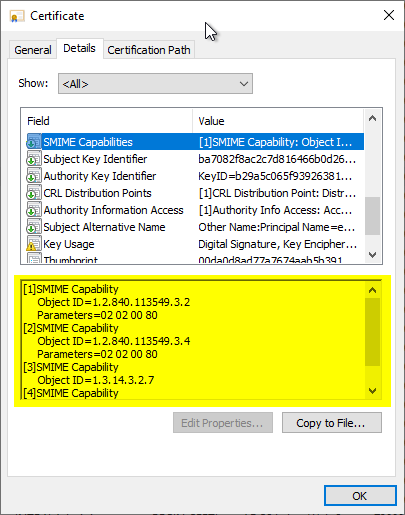
How do the algorithms get into the certificate?
It is important to understand that the values entered in the certificate depend on the type of application:
- Includes the certificate request none "S/MIME Capabilities" extension, the default values from the "DefaultSMIME" registry key of the certification authority are used and written to the issued certificate.
- If the certificate request includes an "S/MIME Capabilities" extension, the requested values are transferred 1:1 to the issued certificate.
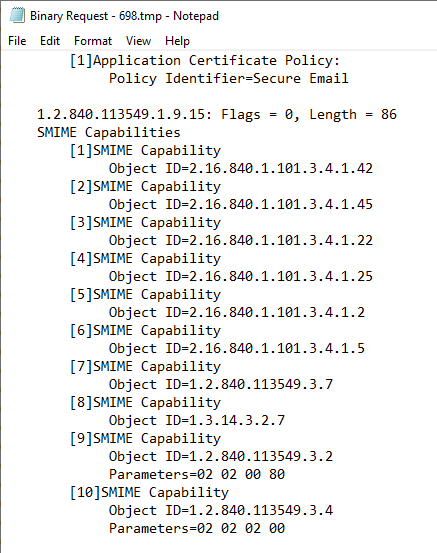
If the request is generated through the Windows means (Microsoft Management Console or AutoEnrollment), the following values are written to the certificate request:
Default values for a certificate template with a Cryptographic Service Provider (CSP)
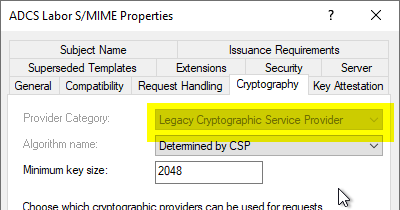
If a Cryptographic Service Provider is configured in the certificate template, the following values are always requested:
[1]SMIME Capability Object ID=1.2.840.113549.3.2 Parameters=02 02 00 80 [2]SMIME Capability Object ID=1.2.840.113549.3.4 Parameters=02 02 00 80 [3]SMIME Capability Object ID=1.3.14.3.2.7 [4]SMIME Capability Object ID=1.2.840.113549.3.7
This corresponds to the following algorithms:
- RC2 in CBC mode with 128-bit key length
- RC4 with 128-bit key length
- DES with 56-bit key length
- 3DES with 168-bit key length
Default values for a certificate template with a Key Storage Provider (KSP)
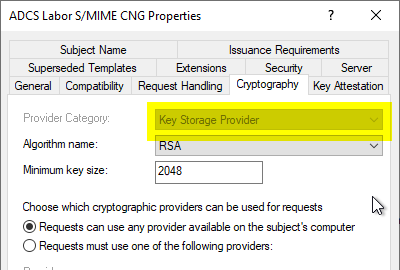
It is important to understand here that the fact that the modern algorithms only appear in the certificate if a key storage provider is used is not a technical requirement. From a purely technical point of view, the modern symmetric algorithms can also be used with a certificate based on a cryptographic service provider if the certificate request has the corresponding extensions.
If a Key Storage Provider is configured in the certificate template, the following values are always requested:
[1]SMIME Capability Object ID=2.16.840.1.101.3.4.1.42 [2]SMIME Capability Object ID=2.16.840.1.101.3.4.1.45 [3]SMIME Capability Object ID=2.16.840.1.101.3.4.1.22 [4]SMIME Capability Object ID=2.16.840.1.101.3.4.1.25 [5]SMIME Capability Object ID=2.16.840.1.101.3.4.1.2 [6]SMIME Capability Object ID=2.16.840.1.101.3.4.1.5 [7]SMIME Capability Object ID=1.2.840.113549.3.7 [8]SMIME Capability Object ID=1.3.14.3.2.7 [9]SMIME Capability Object ID=1.2.840.113549.3.2 Parameters=02 02 00 80 [10]SMIME Capability Object ID=1.2.840.113549.3.4 Parameters=02 02 02 00
This corresponds to the following algorithms:
- RC2 in CBC mode with 128-bit key length
- RC4 with 128-bit key length
- DES with 56-bit key length
- 3DES with 168-bit key length
- AES in CBC mode with 128-bit key length
- AES in CBC mode with 192-bit key length
- AES in CBC mode with 256-bit key length
- AES in key wrapping mode with 128-bit key length
- AES in key wrapping mode with 192-bit key length
- AES in key wrapping mode with 256-bit key length
Keep default values in sync with certificate templates
Do you know TameMyCerts? TameMyCerts is an add-on for the Microsoft certification authority (Active Directory Certificate Services). It extends the function of the certification authority and enables the Application of regulationsto realize the secure automation of certificate issuance. TameMyCerts is unique in the Microsoft ecosystem, has already proven itself in countless companies around the world and is available under a free license. It can downloaded via GitHub and can be used free of charge. Professional maintenance is also offered.
Normally, the values in the certificate authority registry are not used at all. Only in the case that a certificate request is set up without the "S/MIME Capabilities" extension, the default values configured here are used:
HKLM:\SYSTEM\CurrentControlSet\Service\CertSvc\Configuration\{Name-der-Zertifizierungsstelle}\PolicyModules\CertificateAuthority_MicrosoftDefault.Policy\DefaultSMIME
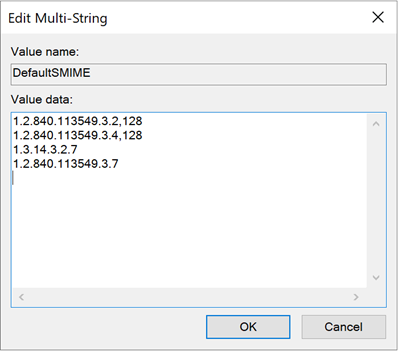
To keep the default values entered under DefaultSMIME in sync with what is requested by a certificate template configured to a key storage provider, the following values would need to be configured on the certificate authority in addition to the default setting:
certutil -setreg policy\defaultsmime +2.16.840.1.101.3.4.1.42 certutil -setreg policy\defaultsmime +2.16.840.1.101.3.4.1.45 certutil -setreg policy\defaultsmime +2.16.840.1.101.3.4.1.22 certutil -setreg policy\defaultsmime +2.16.840.1.101.3.4.1.25 certutil -setreg policy\defaultsmime +2.16.840.1.101.3.4.1.2 certutil -setreg policy\defaultsmime +2.16.840.1.101.3.4.1.5
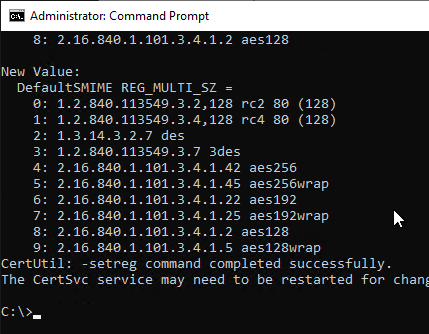
The Certification Authority service must then be restarted for the changes to be applied.
Fine-grained control of S/MIME capabilities
If you want certificates to contain only certain S/MIME capabilities, this is only possible via customized certificate requests, but not via the existing on-board tools, since these always enter default values.
The mistake here is that we as the operator of the PKI - in this case - only enter the applicant's wishes in the certificates issued. Which options the applicant's e-mail program actually supports, however, is logically also up to the applicant.
Manual application for an S/MIME certificate
A manual creation of a certificate request for an S/MIME certificate can be done for example via the PSCertificateEnrollment PowerShell module.
Example:
New-CertificateRequest ` -Exportable ` -Subject "CN=Testuser,E=testuser@adcslabor.de" ` -Email "testuser@adcslabor.de" ` -EnhancedKeyUsage SecureEmail ` -KeyUsage DigitalSignature,KeyEncipherment ` -SmimeCapabilities aes128,aes192,aes256,sha256,sha384,sha512
Please note that central archiving of the private key is not possible with such an application. The applicant is responsible for securing his private key himself. The private key should therefore be marked as exportable and backed up when applying.
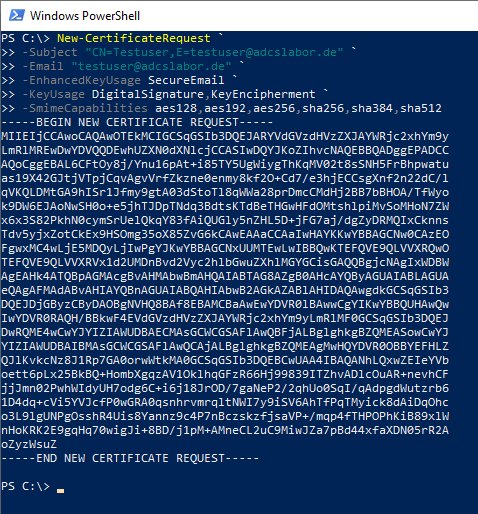
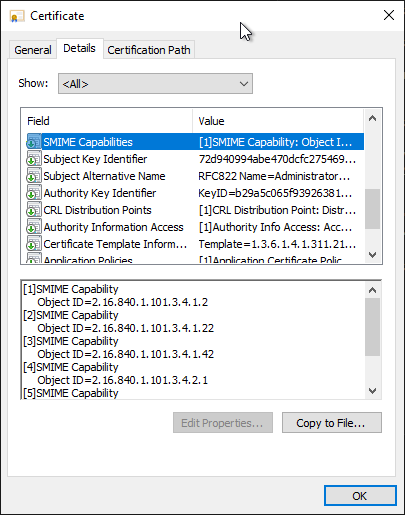
Related links:
External sources:
- X.509 Certificate Extension for Secure/Multipurpose Internet Mail Extensions (S/MIME) Capabilities (Internet Engineering Task Force)
2 thoughts on “Die „S/MIME Capabilities“ Zertifikaterweiterung in ausgestellten Zertifikaten um die Cryptography Next Generation (CNG) Algorithmen erweitern”
Comments are closed.